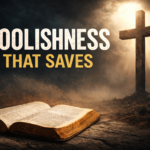“The Acts of… US – No Partiality” – Acts 10:34-48
Introduction: starting in the middle?
Today, for the second time in my series of sermons on the Acts of US, our reading starts in the middle of a story, with a message, while leaving out the context, the event, the story itself. Three weeks ago, our reading from Acts 3 began, “While he clung to Peter and John,” and then it went on to record the message of Peter to the people who had gathered together in the temple area, utterly astounded. I had to tell you that story… that the “he” that clung to Peter and John was a crippled man, and that the people were utterly astounded because Peter and John had healed him with a word and in the power of the name of Jesus Christ.
Today, our reading began, “So Peter opened his mouth and said…” That leads us to ask at least a couple of questions: To whom did Peter open his mouth? To whom was he talking? And Why? What event or question prompted his message?
1. The Acts 10 context
a. The ancient context
Let me give you the context – the ancient context and the more immediate context. Does anybody like bacon for breakfast? What about lobster for dinner? Would you eat a snake, or an alligator? Maybe more importantly, why am I asking these questions? It’s because Old Testament laws prevented God’s people from eating a long list of certain foods that were considered unclean. No Orthodox Jew would touch, let alone eat a snake, an alligator, a piece of bacon, or a lobster tail.
So, as a child, Peter, whose Jewish name was Simon, might have bent down to inspect a snake slithering along the ground when he heard his mother say, “Simon, that’s nasty! Don’t even touch it! Go wash your hands this instant!” Or, if they were passing a Gentile market in Capernaum, and seeing bacon frying over a fire, he said, “Oooh, that smells good! Why don’t we eat that?” Dad would have answered, “Why? Because we’re different, that’s why. We don’t eat pigs. They’re unclean.” To every Jew living in 1st century Palestine, such foods were not just distasteful… they were detestable, taboo, forbidden.
The Old Testament book of Leviticus lists the following animals as ones that were unclean and forbidden to God’s people: pigs, camels, rabbits, vultures, ravens, owls, storks, ostriches, herons, bats, rats, lizards, snakes, and shellfish – like lobsters. What did God have against lobster, and bacon? The Bible doesn’t offer a specific explanation of why some foods were acceptable and others unacceptable. Obviously vultures may have been considered detestable because they feed off of other dead animals. Reptiles, as a whole, were generally considered unclean. Other reasons have been proposed, but the only phrase offered in explanation is this one: “I am the Lord your God. Consecrate yourselves and be holy, for I am holy.” There was just to be a separateness between God’s people of Israel and the people in the cultures that surrounded them. Even in our time, various cultures and countries have arbitrary eating habits and they make their own distinctions about “clean” and “unclean” animals and foods.
b. The immediate context
That was the ancient, historical context of Peter opening his mouth in Acts 10. The more immediate context was a vision that Peter had. He was staying in Joppa, which is part of present-day Tel Aviv. One day, around noon, Peter was praying on the roof-top of the house of his friend Simon, the tanner. He became hungry, and then had a vision in which a sheet was let down from heaven. In the sheet were all kinds of animals and birds and reptiles, including unclean ones. A heavenly voice said to him, “Get up, and eat.” He could still hear his mother’s voice in his conscience, “That’s nasty! Don’t even touch it! Go wash your hands this instant!” So, he declined the offer to eat the unclean food. But the voice returned, “Do not call anything impure that God has made clean.” The same vision and words happened two more times.
While Peter was contemplating what the vision and words truly meant, two servants of the Roman centurion Cornelius arrived from Caesarea, about 50 km. up the Mediterranean coast. They told Peter that Cornelius had had a vision, in which an angel commanded him to send to Joppa and ask for a man named Peter to come to Caesarea, and give the entire household a message from God.
2. Unclean people
Now, let me tell you that certain animals as food wasn’t the only religious restriction that Peter was familiar with. It wasn’t the only prejudice that Peter grew up with. For centuries, the Jewish people considered themselves as different, holy, God’s special people, and for that reason they were to keep separate from the other nations. They were not to permit their daughters to marry foreign men, and they were not to permit their sons to marry foreign women – for fear that those foreign spouses would lead their Jewish spouses away from faith in and worship of the true God. That separateness still existed in Peter’s day, in Jesus’ day, to the extent that the Jews considered there to be only two kinds of people in the world – us and them, Jews and non-Jews, clean and unclean. The them, the non-Jews, the unclean were called ‘goyim’ – Gentiles. Even if, for some reason, Gentiles wanted to bring sacrifices to Israel’s God and worship in the temple, they were required to be separate from the Jews, relegated to the outer area of the temple. The Samaritans – Jews who had their culture mixed with Gentiles some 700 years earlier – were also despised and avoided. That’s why it was surprising that Jesus would even talk with a Samaritan woman in John 4. That’s why it was surprising that Jesus would make the hero of one of His parables a Samaritan… the Good Samaritan.
3. Unclean people no more!
Peter knew and abided by the restrictions of his religious upbringing when it came to the ‘goyim.’ And that’s what he explained to Cornelius when he arrived: “You yourselves know how unlawful it is for a Jew to associate with or to visit anyone of another nation.” That was the rule, that was being “politically correct” before the term had even been invented. Peter was definitely being “politically INcorrect” by setting foot in Cornelius’ home. But the vision of the unclean foods was a parable for Peter – an earthly story with a heavenly meaning – a parable that he lived out that very day. Before we get to Peter’s actual message to Cornelius and his household, it is important to understand that Peter processed the message of his own vision the day before. He said to Cornelius: “God has shown me that I should not call any PERSON common or unclean.”
So, the vision he saw was not primarily about foods… it was about a new attitude to people. Jesus’ great commission in the book of Acts said that His disciples were to be His witnesses in Jerusalem, and Judea, and in Samaria, and to the ends of the earth. Did they really think they would bring the salvation message of Jesus to Samaritans and to the ends of the earth without bumping into Gentiles / goyim?? So, here was Peter’s first time, and he got it. It was OK for Peter to be in Cornelius’ house, and to tell everybody gathered around about Jesus as the Saviour. In fact, Peter likely shared food with Cornelius that day. Maybe, for the first time, he even got to sample that bacon that he had remembered smelling as a kid at the Gentile market in Capernaum.
4. Peter’s message
a. God shows no favouritism
OK… now we get to Peter’s actual message to Cornelius and his household, and the first formal words out of his mouth were regarding his own enlightenment: “I understand that God shows no partiality, no favouritism with respect to people…” In the Old Testament, it was forbidden among those who were judges for the people of Israel to pervert justice by favouring either the rich or the poor. Leviticus 19 makes it clear: “You shall do no injustice in court. You shall not be partial to the poor or defer to the great, but in righteousness shall you judge your neighbour.” That was to be a reflection of the character of God, Himself, as we read in 2 Chronicles 19: “for there is no injustice with the Lord our God, or partiality or taking bribes.”
Peter’s statement is broader. He is saying that God doesn’t accept or reject people based on appearance, or race, or nationality, or class. Cornelius was a Gentile, not a Jew. Based on his name, he was probably Roman, certainly not an Israelite by birth. And he was a soldier, not exactly an approved occupation among the Jews. The second part of Peter’s first sentence explained that God accepted people from every nation who feared Him and who worked righteousness. At the beginning of chapter 10, we hear that Cornelius was described as devout, he did indeed fear God, he had an active prayer life, and he gave to the poor – all of that prepared him to hear the essence of Peter’s message… which was JESUS!!
b. Jesus’ life, ministry, death and resurrection
This is what we heard in our Acts 10 reading. First, Peter alluded to Jesus’ life and ministry – the Baptism by John and the anointing of the Holy Spirit; doing good and healing all who were being exploited by the devil. Peter acknowledged that he and the other disciples had been eye-witnesses of all of that. Then Peter mentioned Jesus’ death at the hands of the Jews, death by hanging him on a tree. That was according to God’s divine plan, for by being hung on a tree He was both accepting the curse, the judgment for our sins, and releasing us from that curse at the same time. The third significant aspect of Peter’s message about Jesus’ presence on earth was His bodily resurrection – also a divine act: “God raised Him on the third day.” That it was a physical resurrection was underlined by the fact that Jesus appeared to them, and that He ate and drank with them after He rose from the dead.
c. The good news: EVERYONE who believes…
The life, death and resurrection were not just events… they were and still are the Gospel, the good news that Peter and the other disciples were commissioned to proclaim to the ends of the earth. The essence of that good news is captured in the last twelve words of Peter’s message: “Everyone who believes in Him receives forgiveness of sins through His name.” That declaration crashes through the barrier of race and nationality, just as Philip’s witness to the Ethiopian man in Acts 8 last Sunday crashed through the barrier of skin colour. “Everyone who believes in Him…” is truly the good news for Cornelius, but it’s also the good news for us, for YOU!!
EVERYONE who believes – that includes Roman soldier, Cornelius… goyim though he may be. That includes YOU – no matter what your appearance, race, skin colour, nationality, age or class. God doesn’t make any distinctions when it comes to salvation. EVERYONE who believes in Jesus as the “hanging on a cursed tree and raised on the third day” Lord and Saviour receives forgiveness of sins. YOU have received the forgiveness of your sins, ALL your sins, because of the precious, holy and powerful name of Jesus!
5. The Acts of US – no partiality!
Now it’s time to bring this home – in our time, and into our lives. My sermon series during this Easter season has been “The Acts of US” – understanding and underlining the fact that the Holy Spirit continues to use our words and deeds to point to Jesus in our day just as He used the disciples in the first century. That means we do want to intentionally point to Jesus with our words and our lives. That means we dare not judge others or exhibit prejudices toward others with respect to gender, culture, age, skin colour, country of origin, occupation or social class, lest the message of Jesus that we are called to share loses its appeal and its effectiveness.
If Peter had left the label ‘Gentile’ or the label ‘centurion’ on Cornelius without meeting him and examining the contents of his life and faith, we wouldn’t have this beautiful story of the Gospel crashing through the Gentile barrier and subsequently being extended to the ends of the earth, according to the “no partiality” character of God. Peter acknowledged his former prejudice – “You know I’m not supposed to associate with you” – but then he communicated a new reality, a new normal. “But God has shown me”… that you are NOT unclean, that YOU need Jesus’ forgiveness and salvation just like I did.
We are called to share the love of God in Jesus across any human barrier because “everyone who believes in Jesus receives forgiveness of sins through His name.”
I want to close with a true story that Andy Stanley tells in his book, Visioneering. It’s meant to expand on Jesus’ words in the Sermon on the Mount about how we point to Him with our words and our lives. Jesus’ words were: “Let your light shine before others, so that they may see your good works and give glory to your Father who is in heaven.”
Andy Stanley introduces the story by saying that we all love to look at people, to watch people, and to talk about others. It is human nature. If you are a parent, you watch how other parents treat their children. If you are married, you watch how other wives treat their husbands or how other husbands treat their wives. If you are an employer, you watch how your employees represent the company.
Andy Stanley then tells the story of his friend Pete who was from the former Soviet Union. Pete hadn’t even heard the name of Jesus until he was ten years old. His family moved to the United States when he was twelve years old, but his parents were agnostic and hadn’t encouraged any religious exploration. Pete was not a Christian when he met Andy, but he had lots of questions about Christianity. They began having lunch together so that Andy could answer Pete’s questions. At their first lunch, Andy asked Pete why he was so interested in Christianity and Jesus. Pete replied, “I am in business with several families who have the kind of marriage I want to have some day. All of them are Christians. I know their families are the way they are because of their Christianity.” After ten months of Bible study, and questions and answers, Pete became a believer. Why? Because several couples conducted their marriages and families and business in a manner that was different from the norm. By watching them, Pete caught a glimpse of something divine. Their lives created a hunger in Pete of what his own marriage and family could be someday. They lived lives worth watching, and Pete was watching.
People are watching us, watching how we live as Christians – in our marriages, in our parenting, in our business ventures.
We learn from Acts 10 today, that God accepts people from every nation who fear Him. God shows no partiality, but looks at every person and says, “That is someone for whom my Son, Jesus, died.” Oh, that we could look at every person in the same way, with no partiality, so that when they look at us, when they watch us, they would conclude, “That is someone in whom Jesus lives,” and that that would create in them a deep hunger to believe in our Saviour Jesus, for “everyone who believes in Him receives forgiveness of sins through His name.” Amen.






